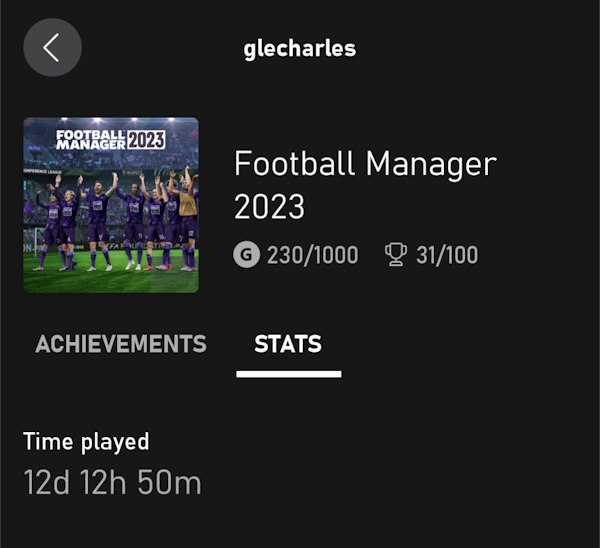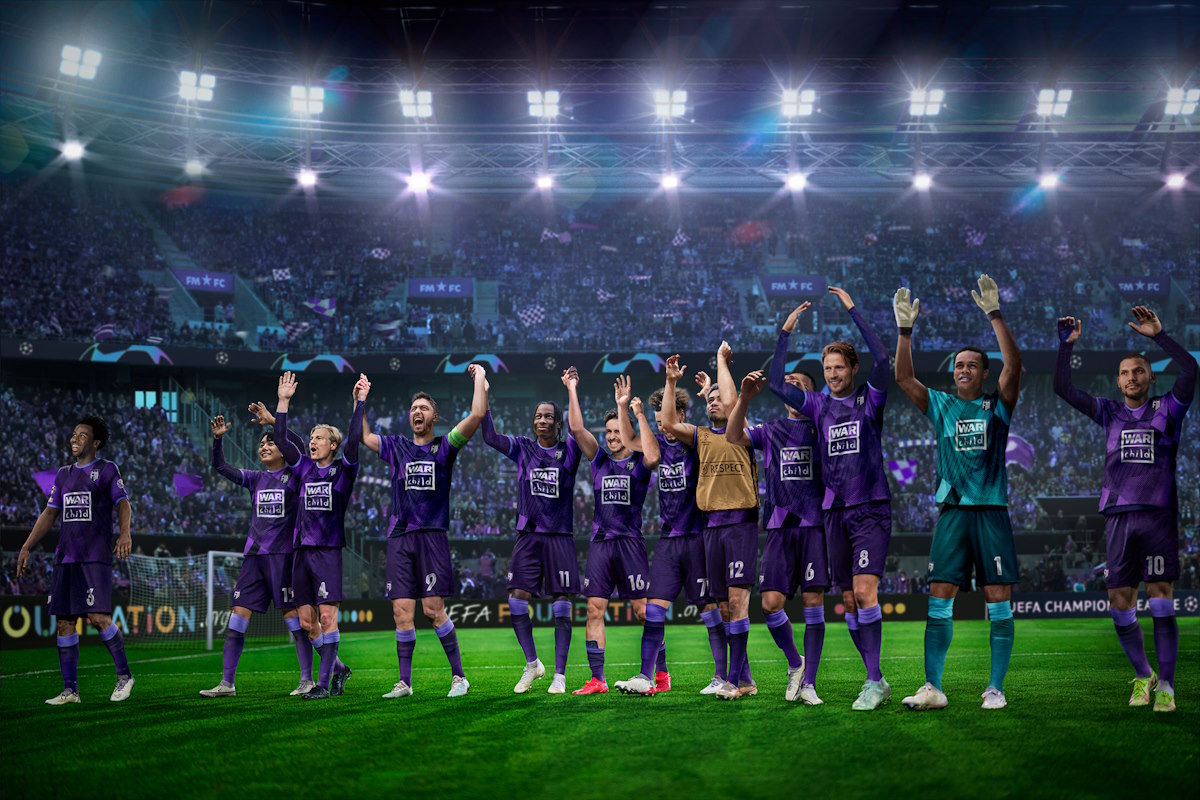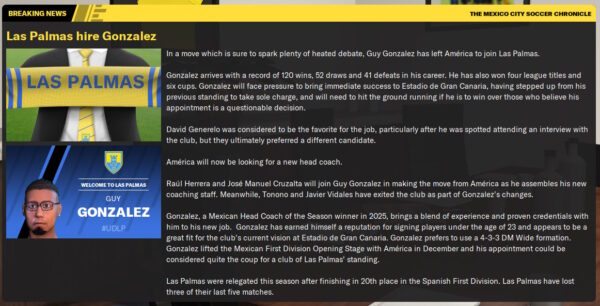This one’s for my pivot table fans, and anyone who likes a LinkedIn-style “what I learned” post…
I’ve been playing video games since the halcyon days of Asteroids and Space Invaders in pizzerias and the Atari 2600 at home, to the present day of Game Pass Ultimate keeping me entertained on my Xbox and non-gaming laptop. My all-time favorites range from Berzerk and Defender to Pokemon and Titanfall, but sitting comfortably atop that list is definitely Football Manager — an immersive management simulation of a sport I didn’t even like ten years ago.
The 2014 Men’s World Cup was perfectly timed as I’d grown bored of baseball and American football after a lifetime of disappointment (relapsed Mets fan, former Jets fan) and was blown away by the fast-paced action, technical skill, and lack of commercial breaks in international soccer. I’ve been hooked ever since, and it’s the only sport I pay close attention to nowadays — from Gotham FC in my backyard to Racing Santander and Real Betis in Spain.
Back then, to fully immerse myself in this new-to-me sport and learn as much as I could about it, I first jumped into the storied FIFA franchise (now EA Sports FC) before discovering Football Manager 2015, and my gaming life changed forever!
In Football Manager, you can manage a football team from almost anywhere in the world, initially of your choosing. From there, you can go on to a multi-year career around the world, or crash and burn in failure to start a new save. It’s a classic management simulator, and unlike FIFA, you don’t actually ever “play” soccer. Your team’s play is simulated based on myriad decisions you make, or don’t make, on a literal [in-game] daily basis. Financial decisions, formation decisions, tactical decisions, training decisions, engagement with individual players and journalists, and by extension, the fans.
You will be praised and roasted! Promoted and relegated! Celebrated and fired!
Some people play games to relax, to escape the tedium and/or stress of their jobs, to challenge their reflexes — physical and mental. Football Manager is a bizarre combination of both, which really should not be appealing at all. It can be stressful and tedious, while also challenging your mental abilities because, at the end of the day, it’s a glorified spreadsheet with multiple pivot tables — and I love it so much, it’s taken me a week to stop playing it long enough to write this post about it!

Football Manager 2023: Visual Excel
I’ve played a lot of Football Manager over the years, including 700+ hours in 2022’s edition, and just over 300 hours of the current edition. I also happen to love spreadsheets, and one of the most amazing professional days of my life was when I learned how to use pivot tables. If you can relate to that, you might love Football Manager even if you don’t love soccer.
It’s easy to lose track of time because every day in-game offers myriad opportunities to pore over and fiddle with a wide range of data, and depending on the league you’re managing in, there might be one or two games each in-game week to prepare for and then watch how it all unfolds in real-time. An in-game week can be as short as 15 minutes if you’re plowing through the game and not fully immersing yourself (wyd?!?!), but an hour is more typical for a week with one match to play.
I usually watch the Extended Highlights of each match, giving myself plenty of time to make meaningful in-game adjustments, but I’ll occasionally watch the full game of a big match, which can be as stressful as watching the real thing — except in Football Manager, it’s YOUR JOB on the line.
In my current 2023 save, I started my career as the manager of the NY Red Bulls in Major League Soccer, a league with some byzantine rules that I assumed I knew well enough because I’d been following it for years, and I knew the real Red Bulls squad like the back of my hand. Ironically, I made a few big roster mistakes in my first season because it turns out I wasn’t Ali Curtis and didn’t fully understand the rules, but I also won the Shield and was named manager of the year! Unfortunately, much like the real-life Red Bulls, we were eliminated in our first playoff game, and the following season got off to a terrible start.
Also like real life, Football Manager can be VERY NOT FUN when things aren’t going well at your virtual job, and I started planning my exit, resigning early in the season before I got fired and ruined my still-good reputation from the season before. I applied for a few jobs in Spain and the fans of those clubs mocked my interest on the in-game social media channels, which are uncomfortably also like real life at times. Surprisingly, a month into unemployment, the biggest team in Mexico, América, reached out and a couple of weeks later I was hired to revitalize a giant club.
I’ve never followed Liga MX in real life, so I had no idea what I’d gotten myself into, despite the hiring process and history of the club making it crystal clear that the bar was set ridiculously high. After a few months on the job and a slow start, I had to beg the board to give me another month to straighten things out, and at one point I’d made the leaderboard for next manager to get fired even though we were in first place at the time!

Fast forward to three years later, I’d won several championships with América, including the coveted North American Champions League, as well as being named Coach of the Year once. Going into the NACL final, I knew I’d reached another milestone, and it was time to start planning my next move, so I applied for an open job in Spain I’d been eyeing for a few weeks as Las Palmas had been relegated early and finally fired their manager at the end of their season.
Leagues across the world don’t have their seasons perfectly aligned, and Liga MX has a particularly brutal schedule if you’re a top club as their playoff structure leaves very little time between seasons if you make the Final every time, which I had. A month went by with no response from Las Palmas and preseason was starting in Mexico, so I could either resign prematurely again and hope I got the job, or stay focused on getting América ready for another season with the assumption that I might still be there.
I stayed focused on Mexico, but started to see hints from social media in Spain that I was in the running, albeit not the frontrunner. I figured if I got the interview, I could make a strong case because my style aligned with theirs and I was coming from a stronger league. You can start out picking your first team in Football Manager, but you have to interview for subsequent moves, even if they recruit you.
It took a couple of more weeks, but I ultimately got the job and was as excited about it as if I was moving to Las Palmas in real life!
A Few Lessons for LinkedIn
One of the reasons I love Football Manager is because it’s basically playing with data and spreadsheets, but I also love it because it’s like a whetstone on which I can sharpen my data analysis and systems thinking skills. I’ll never manage a real-life soccer team, of course, but I’m constantly working with data to find ways to do my real job better, and Football Manager is like a series of fun and stressful data puzzles to keep my brain on a swivel.
Here’s a few things I love about Football Manager that also apply to the real world.
- Culture Fit: Much like my marketing career, my Football Manager style is pure Moneyball. I never (purposefully) manage the biggest teams because being able to sign the best players at any price isn’t nearly as interesting as identifying the hidden gems who can combine into something greater than the sum of their parts. There’s nothing more satisfying than being a “giant killer,” or “punching above your weight,” but doing so means you have to be really good at the details, and often working harder than your peers. Finding the right club that matches your style means you’re more likely to succeed and enjoy yourself, just like researching a company’s culture and mission before applying for a job is common sense. I wouldn’t waste my time interviewing for a team that prioritizes a different style because I’d be doomed to fail, much like I know certain corporate marketing roles would never suit me.
- There is No Playbook: Football Manager has A LOT of data, so much so that there are myriad stories of real-life clubs using it to complement their scouting efforts. The depth of data on players alone is mind-boggling, and it means you can’t just use high-level ratings to assemble a cohesive team, you need a framework that prioritizes specific data that’s most relevant to your context — especially if you’re playing Moneyball. I like a possession-based game with a lot of quick passing (Tiki-Taka & Vertical Tiki-Taka), so I prioritize Passing, Teamwork, and Work Rate as the most important stats when I’m scouting for my teams. Different styles will prioritize other stats, and different players will be better suited for one style more than another. There is no transferable playbook that works everywhere.
- Know When to Fold ’em: In real life, managers get fired every season, for a variety of reasons — some fair, some not. In Football Manager, it can be similarly heartless, especially in leagues where relegation is an ever-present threat, or the difference between finishing 3rd and 7th is literally millions of dollars. It can also be difficult to find another job while you’re still employed, especially if things aren’t going well, but being unemployed for too long can become a scarlet letter. Understanding your team’s objectives is important not only for knowing when you might be in hot water, but also for deciding when you’re ready to take the next step yourself. Some teams may be fine with mid-table obscurity, which can get boring after a while, especially if that lack of ambition impacts your ability to field a competitive team. Alternatively, the pressure to win everything every year and anything less is failure might not be the most fun experience to simulate. I’ve resigned without a job lined up in Football Manager several times, and in real life twice, and they were all similarly exhilarating and stressful. More common, though, is the stealth search you can only really do in real life, and identifying the right time can be the difference between finding a great new gig vs. jumping from the frying pan into the fryer.
If you’ve read this whole thing, I salute you. I’d been sitting on this one for a while, not sure if it was blog-worthy until I remembered that it’s my blog and anything I want to write about is blog-worthy! I’m trying to write a bit more regularly beyond the bi-weekly newsletter, so if you’re interested, sign up to get every new post delivered by email.
And if you happen to also play Football Manager, definitely let me know!
Do you like email?
Sign up here to get my bi-weekly "newsletter" and/or receive every new blog post delivered right to your inbox. (Burner emails are fine. I get it!)



Loved this! your friend in the pivot world…
Hey!!!! 🙂
????Interesting blog, I started following it. I hope you like it too and follow mine. This way we can i
nteract and grow together. A cordial greeting from the south of Spain ???? ????????